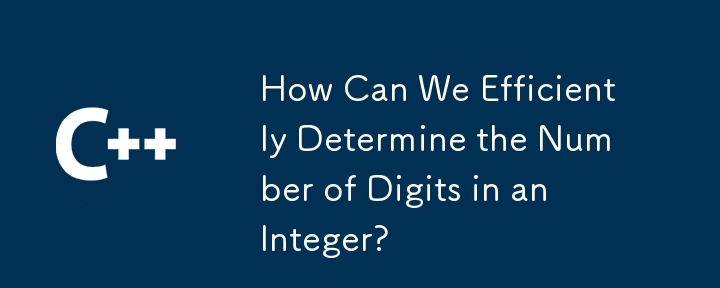

Efficiently Determining the Number of Digits in an Integer
Determining the number of digits in an integer is a common task in programming. It's crucial to find an efficient solution that minimizes the computational cost. Here's a highly efficient method in C :
Lookup Table Approach
An efficient technique involves creating a lookup table that stores the number of digits for each integer. When you need to determine the number of digits, simply look it up in the table. This approach is particularly effective if you know the size of the integer in advance.
Implementation:
<code class="cpp">template <class T>
int numDigits(T number) {
if (number < 0) return 1; // Handle negative numbers (adjust for your needs)
int digits = 0;
while (number > 0) {
number /= 10;
digits++;
}
return digits;
}</code>Partial Specialization Optimization
To further optimize for commonly used number sizes, you can create partial specializations for the numDigits function:
<code class="cpp">template <>
int numDigits(int64_t x) { // Partial specialization for 64-bit integers
// Implementation details ommitted...
}
template <>
int numDigits(int32_t x) { // Partial specialization for 32-bit integers
// Implementation details ommitted...
}</code>Constant Time Optimization
If the number size is fixed (e.g., 8 bits for char type), you can create a precomputed lookup table:
<code class="cpp">template <>
int numDigits(char n) { // Partial specialization for 8-bit integers
// Precomputed lookup table
static char x[256] = {0}; // Initialize lookup table
// Implementation details ommitted...
}</code>These optimizations provide significant performance improvements compared to simpler algorithms like using logarithms or string conversions, making them ideal for scenarios where efficiency is paramount.
The above is the detailed content of How Can We Efficiently Determine the Number of Digits in an Integer?. For more information, please follow other related articles on the PHP Chinese website!
 Usage of rewritecond
Usage of rewritecond
 How to use fit function in Python
How to use fit function in Python
 What are the Go language programming software?
What are the Go language programming software?
 How to buy Ripple in China
How to buy Ripple in China
 The difference between ms card and sd card
The difference between ms card and sd card
 Introduction to CPU performance index parameters
Introduction to CPU performance index parameters
 oracle database running sql method
oracle database running sql method
 Comparative analysis of vscode and visual studio
Comparative analysis of vscode and visual studio




